COVID vaccine nasal spray shows strong immune response in study: 'Could be a game changer'
Live nasal vaccine shown effective in stopping COVID spread — could help to 'greatly reduce disease burden'
A new study has shown promising results for a nasal COVID-19 vaccine, according to researchers at the Institute of Virology at Freie Universität Berlin in Germany.
When two doses of the live nasal vaccine were administered to hamsters, the animals showed a stronger immune response compared to their response to two doses of the vaccines that are currently available.
The study was published in the journal Nature Microbiology on Monday.
COVID VACCINE FATIGUE: STUDY EXPLORES WHY MANY ARE REFUSING BOOSTER SHOTS
The lead author of the study told Fox News Digital this week, "We find that a live attenuated vaccine prevents virus replication — this could be a game changer in controlling SARS-CoV-2 transmission."
Nasal vaccines not yet available in US
Today, there are four approved COVID vaccines in the U.S. — all of which are administered via injection into the muscle, per the Centers for Disease Control and Prevention (CDC).
The Pfizer-BioNTech and Moderna vaccines are both mRNA vaccines, which use mRNA (messenger RNA) to trigger cells to produce a viral protein.
This prompts the immune system to create antibodies.
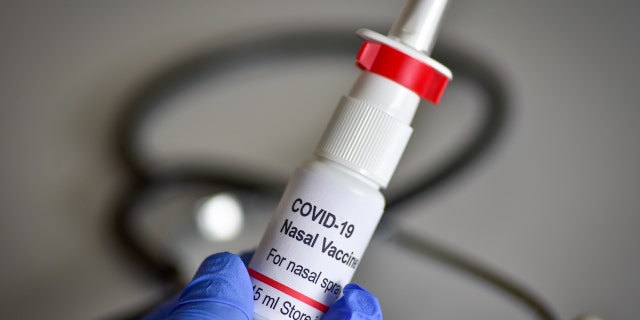
A new study has shown promising results for a nasal COVID-19 vaccine in Germany, according to researchers at the Institute of Virology at Freie Universität Berlin. (A fictional prototype is pictured.) (iStock)
Johnson & Johnson’s Janssen is a viral vector vaccine, which delivers DNA "instructions" to the body’s cells via a different, non-harmful virus.
The Novavax vaccine is a protein subunit vaccine, which uses some proteins of the virus that causes COVID-19 — known as the "spike protein" — to "train" the immune system to act against future spike proteins.
"The goal is to create a barrier to stop virus spread."
The nasal COVID vaccine that's being tested is a live-attenuated vaccine, which means it contains a live but weaker form of the coronavirus.
It works by stopping the virus in the upper airway before it can travel further into the body.
Study focused on Syrian hamsters
The researchers used Syrian hamsters for their vaccine testing.
The study’s lead author, Dr. Jakob Trimpert, head of diagnostics at the Institute of Virology at Freie Universität Berlin in Germany, said hamsters are the "prime non-transgenic [not genetically modified] small animal model" for COVID-19 research.
AI TESTING OF BRAIN TUMORS CAN DETECT GENETIC CANCER MARKERS IN LESS THAN 90 SECONDS, STUDY FINDS
"These animals have the great advantage of being naturally susceptible to SARS-CoV-2 infection, including natural spread between hamsters," he explained to Fox News Digital.
"The infection of Syrian hamsters resembles many key features of moderate human COVID-19 — this makes the hamster an ideal model to study COVID-19 vaccines and therapies."
Nasal vaccines show ‘superior protection’
The nasal vaccines have significant advantages over the injectable vaccines that are currently available, Dr. Trimpert said.
"An intra-nasally applied live-attenuated vaccine provides superior protection against SARS-CoV-2 infection compared to intramuscularly applied vaccines," he told Fox News Digital.
While he said currently marketed vaccines do a good job of preventing severe illness from COVID, Dr. Trimpert pointed out that they don't prevent the infection, moderate illness or spread.
"We find that a live attenuated vaccine prevents virus replication" — so "this could be a game changer in controlling SARS-CoV-2 transmission."
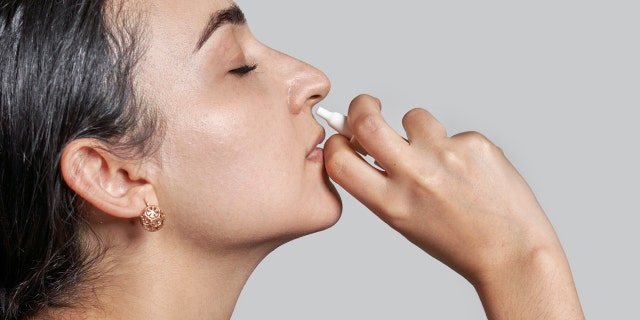
Nasal vaccines have significant advantages over the injectable vaccines that are currently available, said the study's lead author. (iStock)
The main benefit of a nasal vaccine is that immunity is activated right where it’s needed, Dr. Trimpert said.
"It is the induction of local immunity at the site of natural infection that could be a game-changer here," he said.
"Judging from our results, this has considerable impact and greatly reduces the risk of infection."

Doctor sees nasal vaccines as ‘a brilliant idea’
Dr. Marc Siegel, professor of medicine at NYU Langone Medical Center and a Fox News medical contributor, said he finds this new research promising. He was not involved in the study.
"The goal is very important: to create a barrier to stop virus spread," he told Fox News Digital.
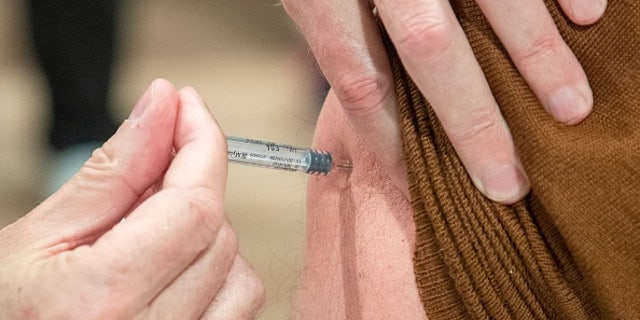
Today, there are four approved COVID vaccines in the U.S., all of which are administered via injection into the muscle, according to the Centers for Disease Control and Prevention (CDC). (Nicolas Maeterlinck/Belgia/AFP via Getty Images)
"This involves IGA antibodies and works at the level of the mucus membranes."
IGA, or Immunoglobulin A, is an antibody that plays an important part in the immune function of mucous membranes.
The mucous membrane, or the nasal mucosa, is the tissue that lines the nasal cavity.
COVID VACCINES ARE NOT NEEDED FOR HEALTHY KIDS AND TEENS, SAYS WORLD HEALTH ORGANIZATION
The nasal vaccine could be standalone or could work in conjunction with other vaccines, said Dr. Siegel.
"If it’s effective and human trials of the German vaccine are ongoing, it will be a big step forward," he said.
Dr. Norman B. Gaylis, who has treated over 1,000 patients at his Long Haul COVID Clinic in Aventura, Florida, also reviewed the findings.
"I believe it’s a brilliant idea to create a vaccine that can build immunity in the nasal mucosa," he told Fox News Digital.
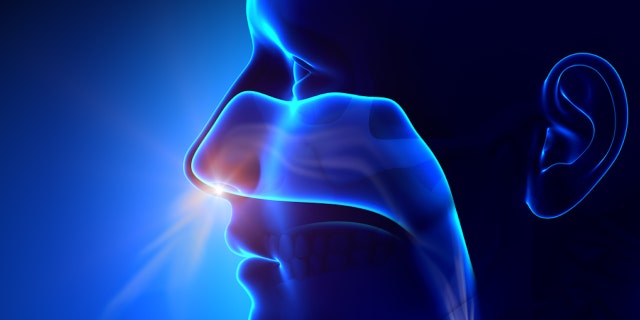
"Research has shown that COVID and other viruses often enter through the nose, and travel up the olfactory nerve … and then into the brain," a doctor explained. (iStock)
"Research has shown that COVID and other viruses often enter through the nose, and travel up the olfactory nerve … and then into the brain," he explained.
Developing a nasal vaccine could help prevent viruses from gaining easy access to the brain, said Dr. Gaylis.
"This is important because many ‘long COVID’ patients are reporting brain damage from the virus," he added.
MOST 'LONG COVID' SYMPTOMS AFTER MILD CASE OF VIRUS RESOLVE IN ABOUT A YEAR: NEW STUDY
Additionally, a nasal vaccine would provide a helpful alternative for patients who have a fear of needles, allowing them to get protected without a jab, said the doctor.
Other nasal vaccines in development
As of July 2022, there were at least 12 nasal COVID vaccines in clinical development, according to Science Immunology.
The biotechnology company Codagenix announced in October 2022 that it had entered the Phase 3 clinical trial for CoviLiv, its intranasal COVID-19 vaccine that is intended for healthy adults.
As of July 2022, there were at least 12 nasal COVID vaccines in development.
The Icahn School of Medicine at Mount Sinai in New York City has launched a Phase 1 study evaluating a new egg-based COVID vaccine, called NDV-HXP-S, which can be administered nasally or via muscular injectionIn June 2022, the National Institute of Allergy and Infectious Diseases published a study illustrating the effectiveness of nasal COVID vaccines in hamsters.
This was followed by another study in September 2022, which showed that nasal vaccines produced a strong immune response in rhesus monkeys.
CLICK HERE TO SIGN UP FOR OUR HEALTH NEWSLETTER
Both China and India have approved nasal COVID vaccines for humans, as reported in the journal Nature in September 2022.
 Those who are considering a new vaccine should consult with a doctor to ensure that it’s right for them.
Those who are considering a new vaccine should consult with a doctor to ensure that it’s right for them.Iran and Russia have also approved nasal forms of the vaccine, though there is limited data available about their effectiveness.
More research is needed
The German research team plans to continue investigating the effectiveness of its vaccines and looks forward to moving into clinical trials.
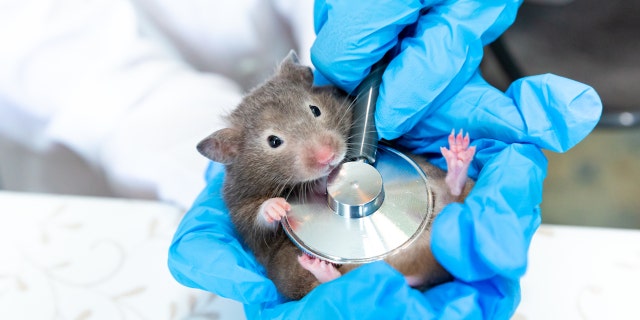
The study focused on Syrian hamsters, finding that the nasal vaccine provided significant protection against the virus. The researchers look forward to moving into clinical trials with humans. (iStock)
"While our results in the animal model are robust, only clinical trials will be able to ascertain translatability to human medicine," Dr. Trimpert said.
Questions remain about the vaccine’s safety for people with weakened immune systems and the potential risk of combining it with different variants of the virus.
The CDC states that severely immunocompromised people and pregnant women should avoid live vaccines.
Said Dr. Trimpert, "We do think there is reason to hope for next-generation COVID-19 vaccines that better control virus transmission and greatly reduce disease burden."
No comments: